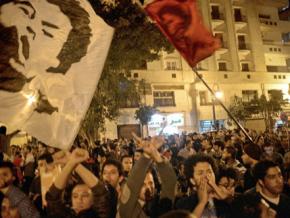Protest the repression in Egypt
Egypt's military rulers are escalating a crackdown against the left after a surge of protests demanding democracy, including the repeal of new laws and policies designed to limit dissent.
Since the military deposed President Mohamed Morsi in July, the regime led by Gen. Abdel Fattah el-Sisi has focused its most severe repression against Morsi's Muslim Brotherhood. In the last several weeks, however, left-wing organizations have drawn large numbers to their protests against military rule, starting with demonstrations on the anniversary of clashes two years ago near Mohamed Mahmoud Street in Cairo, which symbolized the growing anger with the military rulers who took over after the downfall of dictator Hosni Mubarak.
The leftists now being persecuted by the regime were opponents of Morsi and the Brotherhood and helped organize the mass demonstrations on June 30 calling for Morsi's resignation. But the generals' moves against the left show that they want to crush all dissent. They used a November 26 protest outside the Shura Council in Cairo as a test of a draconian new law requiring permission in advance of demonstrations, detaining dozens of protesters. The regime is focusing particularly on the newly formed Revolution Path Front and the main left groups that founded it in September. Thus, at the start of the month, prosecutors issued arrest warrants for Haitham Mohamedain of the Revolutionary Socialists and Mohamed Adel of the April 6 Youth Movement, among others.
At the end of November, the initiated the following statement protesting this latest round of attacks on free speech and protest rights in Egypt.
ON NOVEMBER 24, the Egyptian government passed a law regulating protests which would end the right of assembly. To prove that they were serious about ending protest, two days later, on November 26, the regime violently attacked a protest in Cairo called to demand an end to military trials of civilians, a longstanding demand of the revolution.
In recent weeks, we have also seen passage of clauses for the proposed new Constitution which severely limit the right to protest and organize, as well as ensuring further subordination of the rights of workers, students, women and all oppressed groups to the regime and its foreign backers in government and business.
The attacks by the regime against the anti-military trial protest in Cairo resulted in dozens of arrests. Twenty-one women were arrested, then driven out to the desert and dumped after having been beaten and sexually harassed by the police. Twenty-four men arrested with them remain in jail, and a kangaroo court announced they would be held for 15 days.

Arrest warrants were issued for leading movement figures such as Ahmed Maher, co-founder of the April 6 Youth Movement, as well as leading blogger and organizer Alaa Abd El-Fattah. Even though the latter had announced publicly two days before that he would turn himself in on Saturday as part of taking credit for helping to organize Tuesday's protests, on November 28, police burst into his house, beat his wife and stole phones and computers from his home (for more information, see Kareen Fahim, "Egyptian Riot Police Attack Peaceful Protests in Cairo").
These attacks follow the military's ongoing repression of the Muslim Brotherhood, including violent attacks on protests by its supporters and the imprisonment of peaceful protesters. For example, a court handed down prison sentences of 11 years each for 14 young women simply for participating in a peaceful protest against repression. Seven more, girls too young for prison, were sent to a juvenile detention center until they reach legal age (for more information, see Maggie Michael And Sarah El Deeb, "Egypt: Heavy prison sentence for Islamist women").
Numerous reports of torture of the above detainees have already come out, and as Alaa's mother pointed out, if they would brutalize the family so viciously in their home, what will they do to detainees in prison?
Other prominent figures arrested include Mona Seif (sister of Alaa Abd El-Fattah), founder of the campaign against military trials of civilians, and Ahmad Harara, a dentist who lost an eye to regime guns in an anti-Mubarak protest, and then had the other shot out in a protest against military rule the following year.
In response to these attacks, protests have broken out in several Egyptian cities already, including Suez, Alexandria, Fayoum and, of course, Cairo. On November 28, the regime fired into a crowd at the University of Cairo, killing one student and putting out another's eye.
IT IS important to understand the context of these attacks. The Egyptian people have never given up hope that the revolution's goals of freedom, social justice and dignity can be achieved. Their determination to do so is abundantly evident in such recent actions as the two-week-old strike of Samadoun textile workers, whose sit-in on railroad tracks was violently dispersed by police on November 16th. It is also seen by the sit-in which began November 26 at the Hilwan Iron and Steel Co. plant. Meanwhile, a wave of student strikes and occupations has spread in recent days to several campuses in Cairo and Alexandria, and likely beyond.
This determination to continue the revolution is what the regime fears most of all and is the main motivation behind their new repressive legislation and their vicious attacks.
Supporters of the Egyptian revolution in the U.S. note with outrage the fact that U.S. tax money pays for the weapons used to wound, blind and murder peaceful protesters.
In response to all the above, we demand:
Free all prisoners and detainees; end beatings, torture, sexual assault and detention of peaceful protesters; rescind the anti-protest law and repressive constitutional clauses.
No to military trials of civilians, no to repressive constitutional measures.


